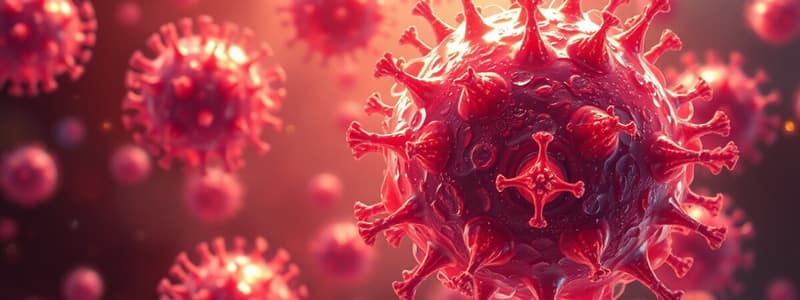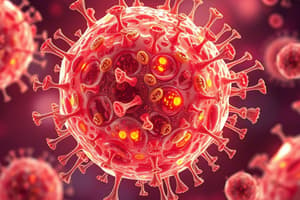Podcast
Questions and Answers
What is the main function of Neutrophils?
What is the main function of Neutrophils?
- Phagocytosis
- Degranulation
- Antigen presentation to T cells
- All of the above (correct)
What is the lifetime of a Eosinophil?
What is the lifetime of a Eosinophil?
8-12 days (circulate for 4-5 hours)
Basophils typically have a lifetime of several months.
Basophils typically have a lifetime of several months.
False (B)
Which cell types can differentiate into macrophages?
Which cell types can differentiate into macrophages?
Which cell is known for tumor rejection?
Which cell is known for tumor rejection?
The main targets of Natural Killer (NK) cells are ______.
The main targets of Natural Killer (NK) cells are ______.
What percentage of adults are Neutrophils typically found in?
What percentage of adults are Neutrophils typically found in?
Flashcards are hidden until you start studying
Study Notes
Innate Immune Cells
- Macrophages are phagocytic cells with a prominent, round-ish, dark purple nucleus. They are found in various tissues and can live for months to years. Their key functions include phagocytosis and antigen presentation to T cells.
- Neutrophils have a multi-lobed nucleus and are the most abundant white blood cells. They are highly phagocytic and have a short lifespan, circulating for just a few hours to days. Their main targets are bacteria and fungi.
- Eosinophils are a less abundant type of white blood cells with a bi-lobed nucleus. They play a role in fighting parasites and are involved in some allergic reactions. Their lifespan is about 8-12 days, with a short circulatory time.
- Basophils are the least common white blood cells, characterized by a bi- or tri-lobed nucleus. They release histamine and other mediators, contributing to allergic reactions and inflammation. Their exact lifespan remains uncertain but likely ranges from hours to days.
- Mast cells are found in tissues and have a central, single-lobed nucleus. They are similar to basophils and play a role in allergic reactions and parasite defense. Their lifespan can range from months to years.
- Lymphocytes (T cells) are involved in adaptive immunity, but also contribute to innate immunity. They have a deeply staining, eccentric nucleus.
- T helper (Th) cells (CD4+) act as immune response mediators, releasing cytokines.
- Cytotoxic T cells (CD8+) are responsible for destroying infected or tumor cells.
- Natural killer (NK) cells target virus-infected or tumor cells.
- Th cells primarily target intracellular bacteria, while cytotoxic T cells are involved in fighting viruses and tumors.
- Monocytes have a kidney-shaped nucleus and circulate in the blood. They differentiate into macrophages and dendritic cells, playing a crucial role in the initiation of immune responses. Their lifespan is measured in hours to days.
- Natural killer (NK) cells are a type of lymphocyte with a single-lobed nucleus. They are essential for tumor rejection and rapid destruction of infected cells. NK cells release perforin and granzymes, both of which induce apoptosis (programmed cell death). They have a lifespan of about 7-10 days.
Macrophage Subtypes
- Macrophages can be found in various tissues and have different names based on their location:
- Dust cells in pulmonary alveoli
- Histiocytes in connective tissue
- Kupffer cells in the liver
- Microglial cells in neural tissue
- Epithelioid cells in granulomas
- Osteoclasts in bone
- Mesangial cells in the kidney
Studying That Suits You
Use AI to generate personalized quizzes and flashcards to suit your learning preferences.



